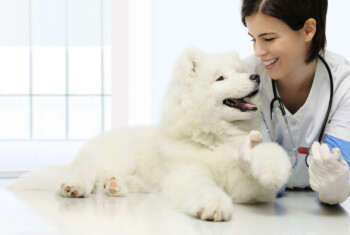BluePearl Pet Hospital shares tips for pet owners in honor of National Take a Walk in the Park Day on March 30.
Spring is here which means people from coast to coast are venturing out of the house to enjoy outdoor activities, including backyard grilling, gardening, exercising at parks, and more. While you head out for some fun and socialization this season, it is important to remember there are certain dangers lurking outdoors for your furry friend.
To help pet owners prepare as they head outside this spring, BluePearl Specialty and Emergency Pet Hospital, which has over 100 hospitals across the U.S., is highlighting some of the top health dangers for pets and ways pet owners can protect them.
Infectious diseases.
Just like humans, dogs love a good park day. But because so many dogs gather at parks, they are at higher risk of contracting infectious diseases there – like kennel cough and canine influenza. Be sure to keep your dog up to date on vaccinations to prevent them from contracting these and other common diseases. Also, because illnesses can be transmitted through shared bowls, it is always a good idea to bring your own water bowls. It is also important to clean up after your dog and clean dogs’ paws once out of the park. Intestinal parasites, like roundworms and hookworms, can be transmitted from dog to another if one steps in another dog’s poop then licks his or her paws.
While heartworm preventative medication can help prevent the spread of some intestinal parasites, owners should continue to follow these tips as a precaution and seek medical attention if their pet begins to show signs of illness.
*Special concerns for puppies: Parvovirus, or parvo, is a highly contagious, potentially deadly disease that attacks the gastrointestinal tracts of infected canines. While puppies are most at risk for contracting parvo, any unvaccinated or partially vaccinated dog can contract the disease through dog-to-dog contact and contact with contaminated stool, environments or people. If left untreated, most parvo deaths occur within 48 to 72 hours. However, survival rates can approach 90% with proper treatment. Be sure to refrain from bringing your dog to the park until they are fully vaccinated.
Heatstroke.
Spring and summer days can be hot and humid. Since dogs have very few sweat glands, they are prone to overheating. They cool themselves off primarily through evaporation off their tongue and mouth (panting) and footpads. When it is humid, evaporation through these surfaces is harder, so they will struggle even more to cool themselves off. Make sure to watch your dog so they do not over-exercise and overheat. Find a shaded area where your pet can rest and make sure to always have water available. If you believe your dog is overheating, immediately apply cold compresses and bring them into the closest pet emergency hospital.
Ticks and fleas.
Fleas and ticks occur naturally in parks and in other wooded areas. Dogs can easily pick fleas and ticks up while running or walking through grass/leaves, or even playing together with other dogs. To help protect your pet from these parasites, try a safe and effective topical oil, a monthly oral tablet, or a flea/tick collar. When leaving the park, be sure to perform a tick check, checking between your dog’s toes, around eyes, in ears, and under their tails so, your pup does not bring any of the disease-spreading bugs home.
Flowers, fertilizers, plants and more.
From certain types of flowers to mulch and fertilizers, it is important to know what could be harmful to pets. One of the most common garden dangers for dogs is cocoa mulch. While known for its rich chocolate-brown color and nutritional benefits for soil, cocoa mulch is toxic to canines. Another common danger for dogs is commercial fertilizers. Dogs can accidentally consume these chemicals just by running and playing outside and then grooming himself. Be sure to wipe your pup’s paws and fur down after playing.
Plants and flowers can also pose risks to pets. Common dangerous plants/flowers include:
- Lilies
- Daffodils
- Tulips
- Azaleas
- Autumn crocus
- Oleander
- Amaryllis
- Sago palm
In addition, there are some mushrooms that can be dangerous or even deadly if consumed by pets. Dangerous mushrooms include mushrooms in the Amanita (includes the “death cap” mushroom), Lepiota, and Galerina families.
Critters.
Due to dogs’ natural curiosity, they tend to stick their noses in wildlife dens, or roam into areas where trouble with wildlife can follow. In fact, over the past five years, BluePearl has treated a combined 2,916 animals (or 524 annually) animals for porcupine quill foreign bodies/attacks and snake bites. Porcupine attacks and snake bites can occur suddenly, and symptoms can worsen within minutes. As true medical emergencies, it is important to get your pet to a veterinary hospital for evaluation as soon as possible.
As you head outdoors this spring, be sure to always supervise your dog. If you think your pet has ingested a harmful toxin, seek immediate emergency veterinary care. If you know that they ate something harmful, bring a sample of the substance with you for more efficient and immediate treatment.
Most BluePearl Pet Hospitals are open 24 hours a day, seven days a week to provide advanced emergency care to pets. Find a local BluePearl Pet Hospital.


